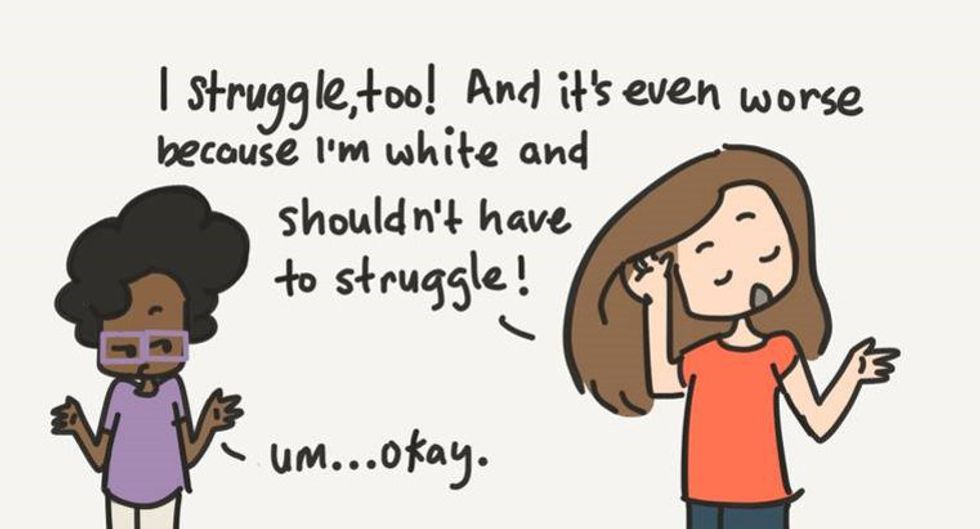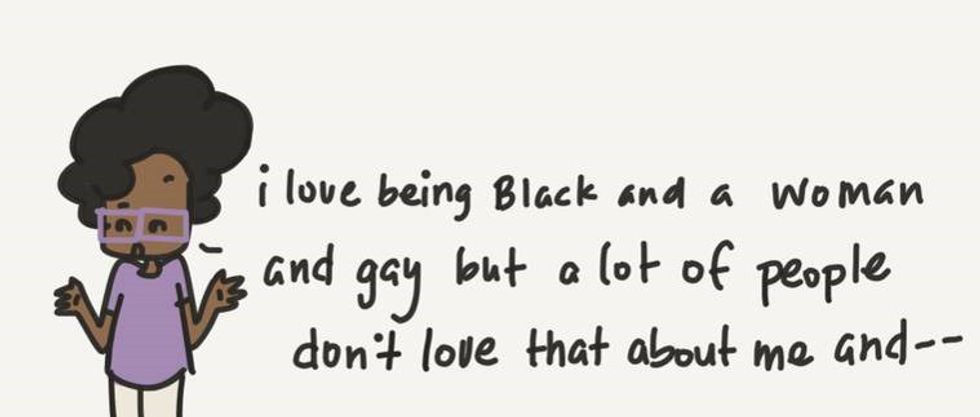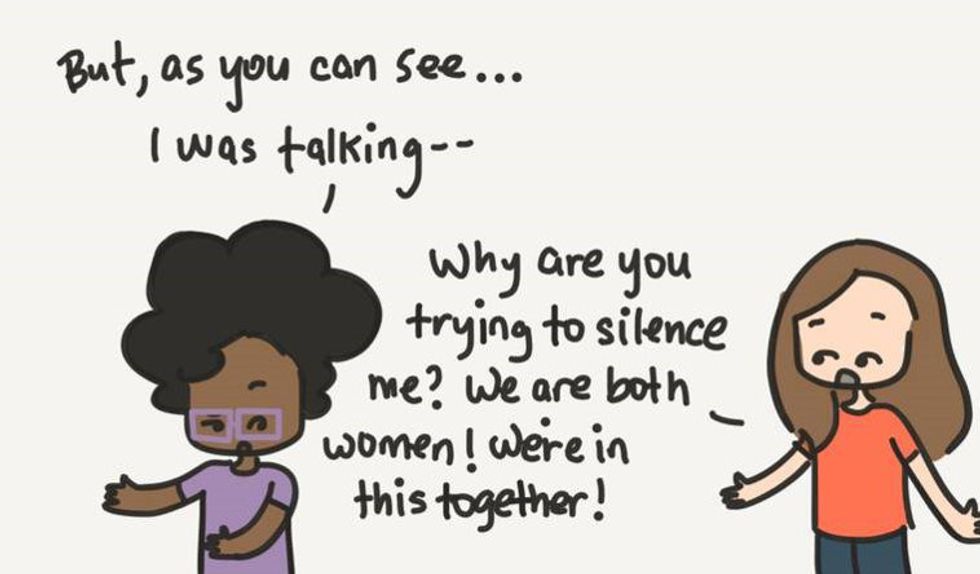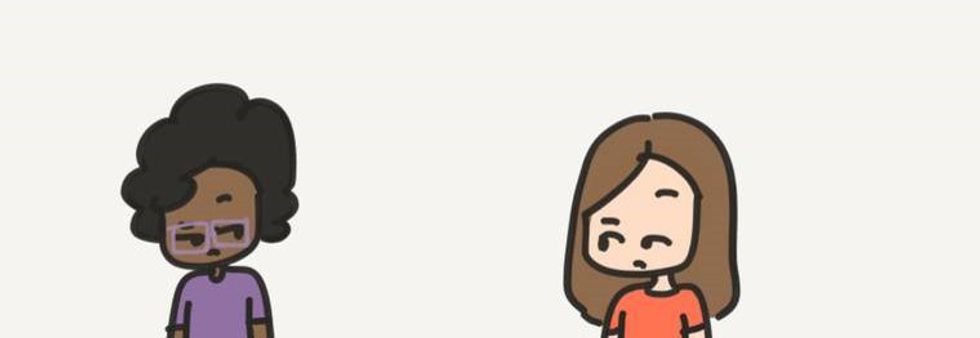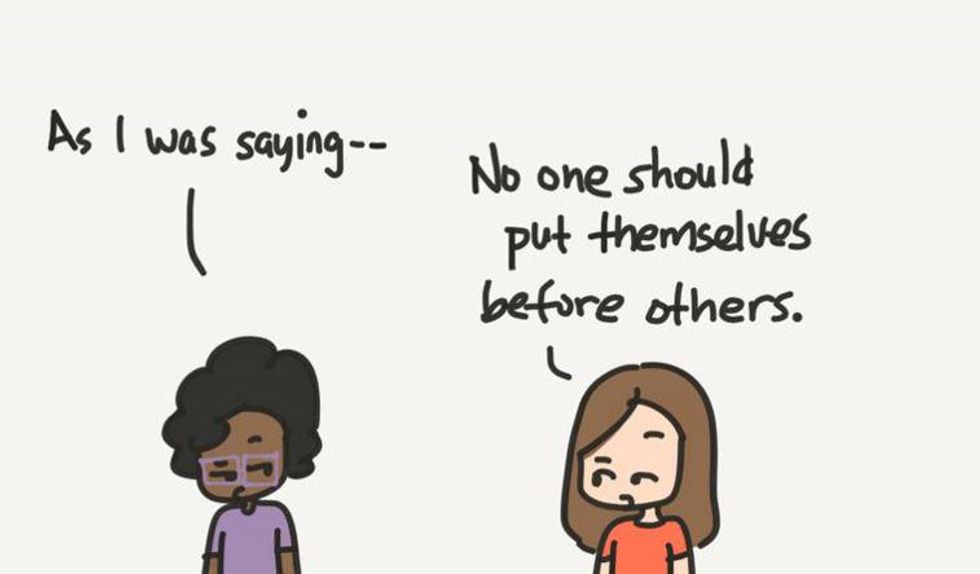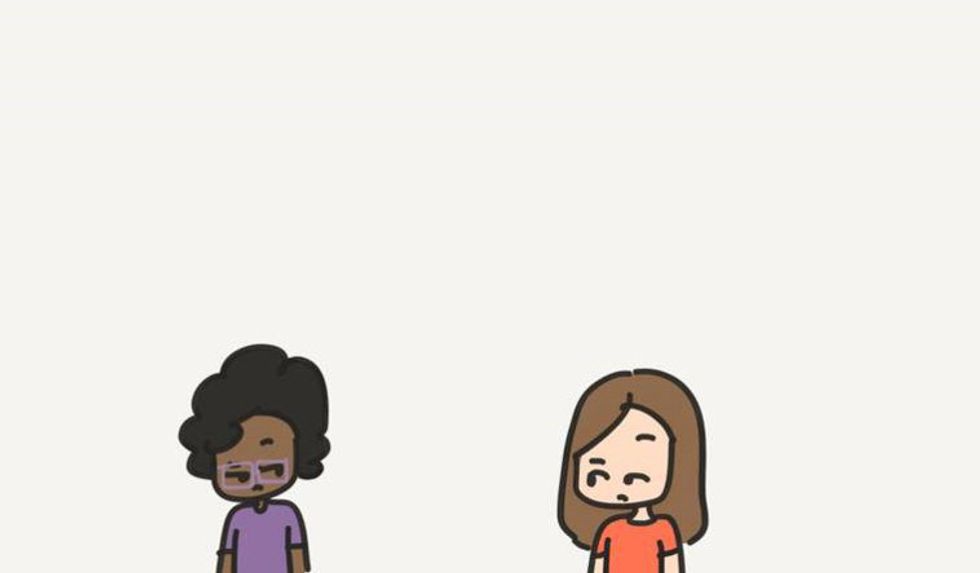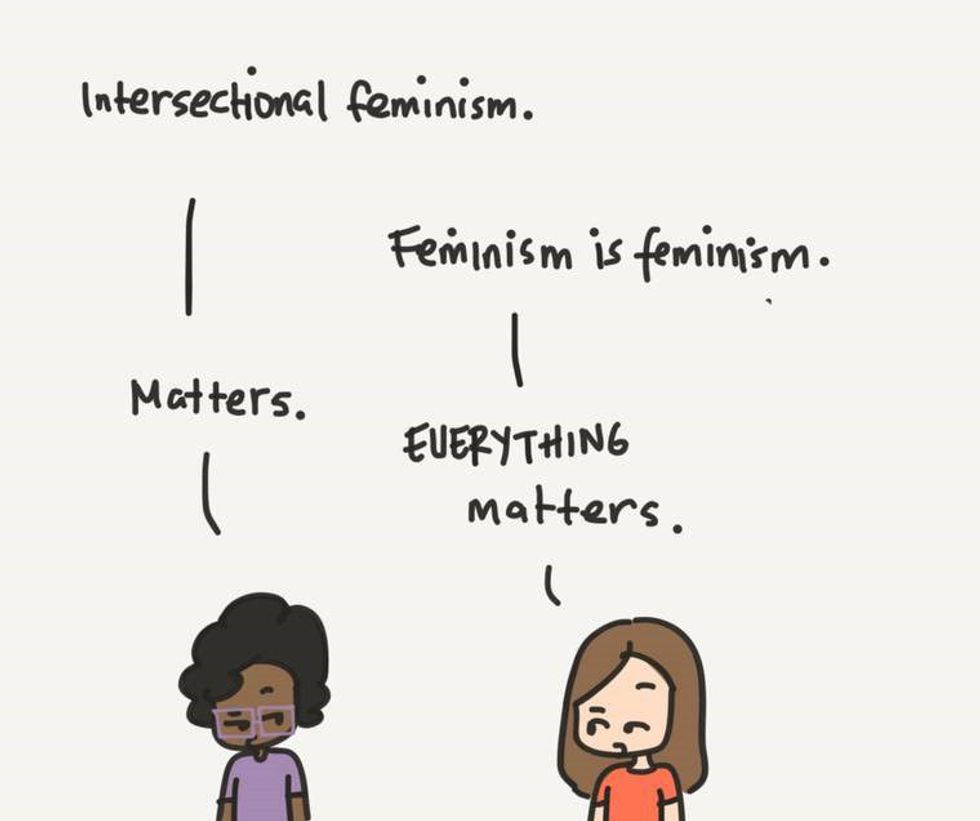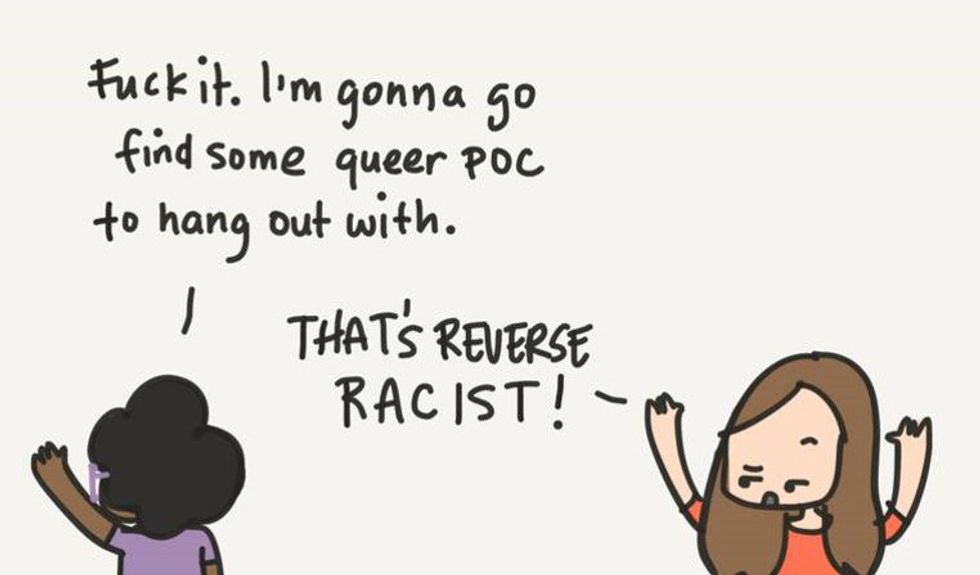A Tumblr comic artist named Alana illustrates the ignorance and hypocrisy of many of the beliefs within white feminism and how white feminist rhetoric is exclusionary to minority groups, like people of color and the LGBTQ community, in her comic “Death to Dickens.” The comic comprises of the dialogue between a gay black woman and a straight white woman as shown:
The dichotomy between black, white, and queer feminism is certainly more complex than this comic illustrates, but it does critique white feminist underlying assumptions, opinions, and practices. The oxford dictionary defines feminism as “The advocacy of women’s rights on the ground of the equality of the sexes.” It is important to note that today’s mainstream feminism is white feminism. The concept of all men and women being equal is great in theory, but in reality, white feminism does not address the needs, concerns, or insights of people of color and people of the LGBTQ community. As we have discussed in class, black women are the most disenfranchised social group due to their race, gender, and sexuality. Rhetoric like “We’re all in this together!” and “We need to be unified!” within white feminism only creates more barriers for marginalized people and assumes that all women should unite under white feminism. Therefore, it is critical that the exclusionary beliefs and practices of white feminism be dismantled so that voices of marginalized groups can speak out without being shut down.
Instead of uniting under white feminism, an intersectional approach to feminism needs to be implemented on a larger scale. One that looks at the different oppressions all people face and how systems of oppression are further perpetuated by white feminism and one’s own privileges in society. Without this approach, social justice for all peoples will never be actualized. We, the entire feminist community, would be stronger together as allies, and supporting each other would mean more effective change.
It is important that I address the injustices of white feminism because I am a firm believer in intersectional feminism. Furthermore, my career as an editor and writer demands I take an intersectional approach in order to be more inclusive. Because I am white, female (I have advantages over individuals with nonbinary genders), and straight, I acknowledge that I have privileges others do not, and that others experience barriers I never would have thought existed before. However, I love being an intersectional feminist because it means I can connect and learn from more people, and I can try to understand the experiences of those who are marginalized in our society. With that knowledge comes empowerment to help others by being an appropriate and supportive ally. I hope to be this ally and work to dismantle the problematic beliefs of white feminism.
White feminism has an underlying assumption that all women experience oppression the same and therefore all feminists should unite under white feminism which is problematic as Brittney Cooper points out in her Salon article “Feminism’s ugly internal clash: Why its future is not up to white women.” She asserts that minority individuals experience oppression differently than white middle-class women and are concerned about different social issues. She gives the example of white middle-class women focusing on equal pay when black feminists are more concerned about obtaining good jobs rather than being regulated into low-wage work. Cooper explains that:
White women’s feminism still centers around equality. Black women’s feminism demands justice. One kind of feminism focuses on the policies that will help women integrate fully into the existing American system. The other recognizes the fundamental flaws in the system and seeks its complete and total transformation.
Cooper also asserts that feminism should not just be about white middle-class women’s needs, but all women’s needs. “So what we need feminism to give a care about is not simply or primarily the plight of white middle-class, straight, American moms and their children, but rather the plight of non-white, non-middle class, non-straight, non-cisgender, non-American women and children.” White feminists might say that they are advocating for all women, but their ignorance and exclusion of minority women experiences demonstrates that they are only advocating for themselves. On the flip side, white feminists cannot start advocating for people of color and the LGBTQ community because, unless it's done correctly, such actions would further perpetuate the systematic oppression.
In Linda Alcoff’s article “The Problem of Speaking for Others,” Alcoff goes into detail about retreat as people’s response to the predicament of speaking for others. Indeed in class, we discussed how this predicament makes us feel paralyzed because it is so complicated. I even feel this way. I want to help make our communities more accepting and celebratory of others, and I want to help fight social injustice, but if I do it in the wrong way I will be contributing to the systemic oppression. However, if I do nothing then that is also a problem. Alcoff asks an important question: “If I don’t speak for those less privileged than myself, am I abandoning my political responsibility to speak out against oppression…?” My answer is yes. If I abandon people living under oppression and don’t speak up for them, then I am abandoning my duty as a fellow human being and my core values of helping others in need. Therefore, retreat and paralysis are not options for me.
Before speaking for another, one must consider their own social standing and privilege. Alcoff argues: “Where an individual speaks from affects both the meaning and truth of what she says and thus she cannot assume an ability to transcend her location.” Because I am white, female (I have privileges other people with non-binary genders do not), and straight, I naturally have a biased perspective. I can try to educate myself and minimize that perspective as much as possible, but that bias will always be there, which lowers my credibility. If I am speaking on police brutality, my credibility automatically goes down because I am not affected by this systemic oppression. However, my believed credibility will also depend on my audience. If I am speaking in front of a completely white audience, they are more likely to believe me than a black person because I am white. This stems from other people’s biases and their willingness to believe a fellow white person than an “other” person who likely has better knowledge on the issue.
Another step to take before speaking for others is listening first before speaking. Alcoff states: “If our immediate impulse is to teach rather than to listen to a less privileged speaker, we should resist that impulse long enough to interrogate it fully.” Right now, my instincts actually are to listen rather than speak first because I know I am not educated enough on certain issues to speak out. So I try to learn as much as I can about other people’s experiences. Even after I feel like I know everything about an issue, which I never will, I must let others who experience that oppression speak first. Then, and only then, if I have anything new and of value to contribute to the conversation, can I speak up. However, I am not sure how this works in public writing. Does writing about social issues count as speaking first rather than listening? I think it depends on how I go about writing or editing social issues.
While writing this article, I have thought a lot about how I can help transform the mainstream white feminism to be more inclusive of other feminisms and the groups those feminisms represent. I have come to two conclusions on my own agency. The first is thinking about what I can do right now with the limited resources that I have as a college student. The second is planning out my agency in accordance with my career path.
The first thing I can, and will, do is educate myself on non-white and queer feminist theories and understand the issues minorities are concerned about from their perspective. When I am having a discussion with someone who is promoting non-inclusive white feminist ideas I can point out the flaws in their argument because I educated myself on other worldviews other than my own. I can explain why an x solution to a y problem might only work for white middle-class women and would ignore the needs of people of color and the LGBTQ community. Furthermore, I can recommend good non-white and queer feminist sources to them so they can educate themselves on those differing worldviews. Moreover, having knowledge of other theories means I can be more mindful in my own writing, and be more inclusive of diverse thoughts and ideas.
This brings me to my second point. While researching and writing about a social issue, I must analyze it from all perspectives---not just those of white women. Not only that, I would have to take an intersectional feminist approach to that social issue because people experience oppression differently. To do this, I must be constantly seeking out the writing of non-white and queer feminists and referencing them in my work. Aside from the fact that it’s plagiarism, not referencing those authors and presenting their inquiry and arguments as my own would further perpetuate the non-inclusive and racist status quo of white feminism. The problem about writing my opinions on social issues is that, if I am not contributing a new perspective to the table then I am just taking up space where other voices could be heard. Furthermore, if I do not contribute new ideas, and I am referencing black or queer feminists, it would be like I am validating their work rather than their work standing just fine on its own. The difficulty in avoiding these errors is that no matter how much I research, there will always be someone who said my ideas first. At least it seems this way unless I become a revolutionary feminist.
On an interpersonal level, I can start dialogue with people from diverse backgrounds to learn their perspectives and opinions on social issues. More than that, though, I would get to know them as people and possibly even befriend them. The important aspect in creating change is focusing on building relationships because it is the people that are affected by oppression, then focus on dismantling larger social issues. By befriending others with diverse backgrounds I can learn so much from them, and I would focus on being the kind of supporting ally they would want and/or need me to be. Lastly, if they were willing, they could read my work and point out any flaws regarding terminology, word choice, holes in my argument, perspectives I hadn’t considered, and any incorrect explanations I have.
There are other types of agency I can use as well. I can get involved and volunteer for organizations that address the needs of non-white and queer individuals. I could even work for such an organization as an editor or a marketing and communications specialist. Who knows, maybe I could even lead an organization like this one day. This kind of activism is definitely in my future plans, I am just not sure when. In the meantime, my career goal is to one day, hopefully in 15 years or so, create my own magazine or journal. I would have a larger overarching journal name with branches on different subjects like global culture, American culture, intersectional feminism, black feminism, queer feminism, etc. I would make sure to have a diverse staff, from authors to executive editors, who would accurately explain social issues and bring in their own perspectives. By actively striving for a diverse staff, I would be giving agency to those who might not have had it before. One problem with this mentality is that it still follows a white savior narcissistic vibe. I do not really know how to change this mentality, and I don’t know if I can. As we have discussed in class, sometimes there is just no way to set aside one’s own privilege. That being said, I would rather have a diverse set of voices on my staff and give them agency than have a white washed staff with biased worldviews.
White feminists may strive for equality in society, but in doing so they are only thinking of their own demographics. Before they change their approach and start being more inclusive of all people's experiences, they must consider their own privileges. They must be careful not to draw attention to themselves, but rather to those who are affected by systemic oppression, and they must step aside if someone affected by this oppression is trying to speak out.
Non-black or non-queer feminists can aid them in their quest to speak out, but we cannot speak over them. Essentially, we can be an ally to those who need the support, but we cannot take center stage because the spotlight should focus on them. In the media, things become even more complicated. One must be sure that the message they are trying to communicate is the correct one, and they must ensure their claims support the campaigns of people of color and the LGBTQ community. Furthermore, before advocating for others, one must try to learn people’s personal experiences in order to have the empathy and understanding to frame issues in a way that benefits minority communities rather than perpetuating systemic oppression.


